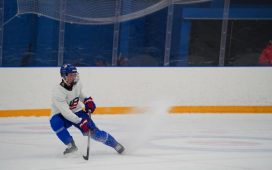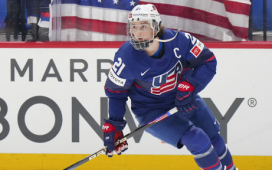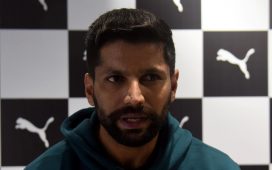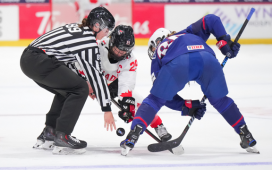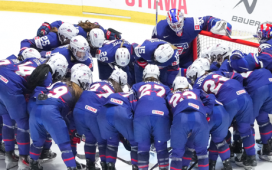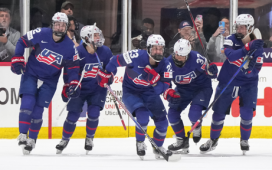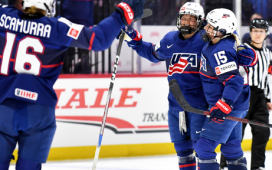The abrupt retirement of Indianapolis Colts quarterback Andrew Luck stunned the sporting world Saturday evening. In the midst of one of the Colts’ NFL preseason outing, the news broke that the 29-year-old, who had been battling injury but was fresh off of arguably the best campaign of his career, had decided to hang up his cleats.
In the time since his announcement, Luck’s story has been the biggest sports story in North America. Here he is, in the prime of his career, walking away from the game after suffering a laundry list of ailments throughout his career and deciding that he had had enough, mentally and physically, after repeated rehab stints. And Luck’s retirement got us thinking. Be it due to repeated injury, fatigue or a simple desire to leave the NHL, who are some of the most notable names in league history to depart well before most expected?
From Hall of Famers who had their careers cut short on through to European imports who left while they were still top-six talents, here are 10 notable NHLers who left before it was their time:
Bobby Orr
Invariably the first name that comes to mind, Orr played his final full season with the Boston Bruins when he was 26, leading the league in assists, points and etching his name onto his eighth-consecutive Norris Trophy. But following the 1974-75 season, Orr was only able to play another 36 games in the NHL across a four-year span – he skipped one season entirely – as a result of repeated knee surgeries. When Orr retired, the waiting period for the Hall of Fame was waived and he entered immediately. He was 31 when he announced his retirement.
Ken Dryden
Next to Orr, Dryden might be the next-most decorated player to exit the NHL, and his story more closely aligns with that of Luck. Granted, Dryden didn’t battle injuries in the same way, but he departed on his own terms following the 1978-79 season, a 31-year-old still right in the prime of his career. During his final season, Dryden backstopped the Montreal Canadiens to their fourth-consecutive Stanley Cup, won his fourth-consecutive Vezina Trophy and was a first-team all-star for the fourth season running. As it so happens, Dryden’s retirement wasn’t his first departure from the NHL. He sat out the entire 1973-74 season, spending that year working at a Toronto law firm.
Kent Nilsson
As the WHA clubs were absorbed by the NHL, Nilsson found himself heading to the Atlanta Flames and soon starring north of the border again in Calgary. Across the next five seasons, Nilsson scored 189 goals and 469 points with the Flames, later landing with the Minnesota North Stars before a late-season stint and eventual Stanley Cup victory with the Edmonton Oilers in 1986-87. After that season, Nilsson departed the NHL. Only 13 players registered more points than Nilsson during his NHL tenure. He later returned for a brief stint in Edmonton in 1994-95, but that six-game stay is a mere footnote on an NHL career that really concluded when he was a 30-year-old.
Mike Bossy
Bossy is arguably up there with Alex Ovechkin as the greatest natural goal scorers in NHL history. He burst onto the scene in 1977-78 with a 53-goal, 91-point Calder Trophy-winning season and proceeded to score at least 50 goals in each of his next eight seasons, including five seasons of at least 60 goals. But by 1986-87, Bossy was battling back injuries and managed to score only 38 goals and 75 points in 63 games. He decided to sit out the following campaign and never returned to the NHL. He played his final game at 30 and retired at 31 ahead of the 1988-89 season.
Hakan Loob
Loob falls right into the Nilsson category. Consider his numbers: after joining the Calgary Flames in 1983-84, he proceeded to score 193 goals and 429 points in 450 games on through to the 1988-89 campaign. He was the 32nd highest scorer in the NHL over that span. As the story goes, though, he and his wife made a decision to raise a family in Sweden, so the then-28-year-old turned down an offer from the Flames and headed overseas. His name adorns the trophy awarded to the Swedish League’s top goal scorer.
Cam Neely
Relatively quiet in his early years, Neely was a breakout sensation once he was dealt to the Bruins by the Vancouver Canucks. His first season in Boston, he scored 72 points, nearly doubling his previous career-best output, and went on to score 344 goals and 590 points across 525 games during his time with the Bruins. But during the final four seasons of his career, the writing was on the wall. Neely missed almost the entire 1991-92 and 1992-93 seasons, playing just 22 games, and despite scoring 50 goals in 49 games during the 1993-94 campaign, Neely’s body was failing him. He played two more seasons and later attempted a comeback, but played his final games at 30.
Pat LaFontaine
Like others on this list such as Orr, Bossy and Neely, LaFontaine had his career cut short due to injury. However, it wasn’t joint pain that caused LaFontaine to hang up his skates. Instead, he was one of the first high profile concussion victims in the NHL. He had suffered repeated head traumas during his time in the NHL, including a concussion during the 1996-97 season that limited him to only 16 games. He returned the following season and managed to play 67 games, but a late-season blow sidelined LaFontaine for good. He sat out the 1998-99 season and announced his retirement ahead of the 1999-00 campaign. He was 34.
Mario Lemieux
Lemieux makes the list, though only because no one could have known that he would eventually return to the game. Already, Lemieux had been forced to miss considerable time throughout his career. His 1993-92 season had been cut short by a cancer diagnosis. His 1993-94 season was marred by back injuries. The campaign following that, he spent a year off to recuperate. And though he return and was as good as ever in 1995-96 and 1996-97, winning consecutive scoring crowns, his third career Hart and fourth Lester B. Pearson Award, Lemieux, then 31, retired following the post-season. Of course, he later returned to the NHL in 2000-01 and played five more seasons, during which he scored 77 goals and 229 points in 170 games. He retired for good following the 2005-06 campaign.
Pavel Bure
There are few goal scorers who have ever done it with Bure’s flair. His combination of speed and finishing ability was a rarity in the game, particularly at the height of his powers. Twice in his first three seasons he scored 60 goals and twice more, during the so-called ‘Dead Puck Era,’ Bure flirted with the plateau. Those seasons in 1999-00 and 2000-01, during which he scored 58 and 59 goals, respectively, saw him become the second and third recipient of the Rocket Richard Trophy. Bure, who had his 2002-03 season shortened, missed the 2003-04 season due to a knee injury, sat out another due to the lockout and then retired ahead of the 2005-06 season. No one knew that the then-32-year-old’s games during the 2002-03 season would be his last.
Ilya Kovalchuk
Like Lemieux, Kovalchuk lands on the list under the same principle: he was at the height of his game and left, and some believed he would never be seen again. His departure, much like Luck’s, was absolutely stunning in that it seemingly came out of nowhere. He had been relatively healthy throughout his career and was only one season removed from helping the New Jersey Devils to the Stanley Cup final and getting the nod as a first-team all-star, but following the lockout-shortened 2012-13 season, Kovalchuk retired, thus voiding the final 12 years (!!!) of a 15-year, $100-million contract he had signed with the Devils. It was another five seasons before Kovalchuk returned to the NHL, and he completed the first year of a three-year pact with the Los Angeles Kings in 2018-19.
Want more in-depth features, analysis and an All-Access pass to the latest content? Subscribe to The Hockey News magazine.
